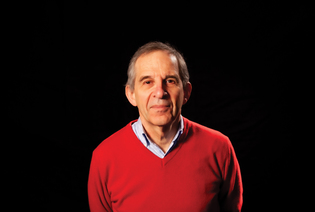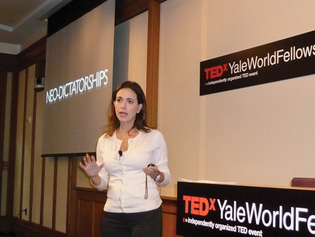
Dan Renzetti
Yale professor emeritus Michel Devoret, the 2025 winner of the Nobel Prize in physics, thought he was being pranked until his daughter confirmed news of the Nobel Prize.
View full image
Nobel Prize for a Yale physicist
In the 1980s, when Michel Devoret was a postdoc at UC-Berkeley, he spent long days trying to coax forth quantum effects, which typically occur on infinitesimal scales, in electrical circuits big enough to see with the naked eye. The careful experimentation paid off, laying the foundation for modern quantum computing.
Forty years later, this October, Devoret—now the Frederick W. Beinecke Professor Emeritus of Applied Physics at Yale—won the 2025 Nobel Prize in physics for the pioneering work. He shares the prize with John Clarke, a professor emeritus at Berkeley and Devoret’s advisor, and John Martinis, then a graduate student in Clarke’s lab, now professor emeritus at UC–Santa Barbara. He joins economists Robert Shiller and William Nordhaus ’63 and biologist James Rothman ’71 as the fourth living Yale faculty Nobel laureate.
Devoret was asleep when the Royal Swedish Academy of Sciences tried to contact him. He retired from Yale in 2024 and is now a chief scientist for Google Quantum AI and a professor at UC–Santa Barbara. He believed the messages to be a prank until his daughter, in Paris, confirmed the news. “I hadn't realized it was Nobel season because I currently have three jobs,” he said.
Born in Paris in 1953, Devoret's interest in science blossomed in high school when he and friends, using components donated from a nearby lab, built a small computer. He also, in his spare time, would fabricate and launch rockets, a hobby he described as “highly dangerous, but highly educational.”
Devoret attended college at the École Nationale Supérieure des Télécommunications and went on to complete a graduate degree at the University of Paris, Orsay, where experimental work detecting quantum particles and studying quantum mechanics allowed him to explore this mysterious corner of physics. After his Berkeley postdoc, Devoret returned to France and started a research group within the Commissariat à l’Énergie Atomique (CEA) at Saclay. For more than 25 years there, he centered his attention on quantum mechanical electronics. Then he moved to Yale, where he had the “good fortune,” as he has put it, to restart his career.
“We hosted him for a sabbatical in 1999, and recruited him in 2002,” says A. Douglas Stone, a professor of applied physics at Yale who has been a friend and colleague of Devoret’s for almost 40 years. “Even then it was clear he was a Nobel-caliber physicist.”
At Yale, Devoret worked alongside others to generate a series of breakthroughs, from creating the first rudimentary solid-state quantum processor to devising a system that predicts the “jumps” of quantum data. He helped found the Yale Quantum Institute in 2014. And though teaching and mentoring students was new to him—he was a pure researcher while working at CEA—he excelled at the task.
“Michel always made time for long discussions despite his immensely busy schedule,” says Uri Vool ’17PhD, who completed his PhD under Devoret and now works at the Max Planck Institute. “His excitement and wonder were quite contagious.”
Shortly after confirming that the Nobel announcement was not a prank, Devoret was asked how his life would change. He answered by suggesting, in essence, that it wouldn’t: He will continue to devote his time to improving electrical circuits in service of large-scale quantum computers. And he will try to motivate kids to pursue a life in science with the same open-eyed curiosity he has, to see in physics experimentation the beauty that he sees, to take sensory pleasure, as he does, in laboratories stocked with screws, springs, wires, transistors, and oscilloscopes, scented by the trace of soldered copper wire, overflowing with precisely machined tabletop equipment. “We have to infect a new generation with amazement at the wonders of quantum physics,” he says. —Dylan Walsh ’11MEM
__________________________________________________________________
Nobel for econ PhD
Joel Mokyr ’74PhD, a Northwestern University professor, was one of three to win the 2025 Nobel Prize in economics. He was awarded “half the prize” for “having identified the prerequisites for sustained growth through technological progress.” The other half went to French economist Philippe Aghion and Brown University professor Peter Howitt for “the theory of sustained growth through creative destruction.” Together, they show “how new technology can drive sustained growth.” In his work, Mokyr examines how societies avoid stagnation, demonstrating how important the acceptance of change and new ideas are in order to build on innovation. News came as this magazine was on press.
__________________________________________________________________

Yale Jackson School of Global Affairs
When she learned the news, María Corina Machado said: “This is an achievement of a whole society. I am just one person. I certainly do not deserve this.”
View full image
Nobel Peace Prize goes to former Yale World Fellow
María Corina Machado, the Venezuelan opposition leader living in hiding, is the 2025 Nobel Peace Prize laureate, honored “for her tireless work promoting democratic rights for the people of Venezuela and for her struggle to achieve a just and peaceful transition from dictatorship to democracy.”
Machado was a member of the 2009 Maurice R. Greenberg World Fellows Program, which brings together global leaders for a four-month residency at Yale. In 2010, she was elected to Venezuela’s National Assembly with a record number of votes.
A year later, in a TedxYaleWorldFellows talk, she talked about her country: “As a Venezuelan, I grew up proud and grateful for having the most stable and long-lasting democracy in Latin America. We took democracy for granted—and we were wrong, very wrong.” She went on to ask: “Are there lessons other countries can learn from our experience?” Then she described how former Venezuelan president Hugo Chávez created a “neo-dictatorship” playbook since repeated in other countries.
Machado was removed from office in 2014, a year after Nicolás Maduro assumed the presidency. She continued her activism despite accusations of treason, in 2017 cofounding the Soy Venezuela platform, an alliance of large sectors of the country committed to democracy. She announced a bid for the 2024 general elections, but was blocked from running; nevertheless, she won the 2023 primary. Escalating threats forced her into hiding last summer.
More than 400 people from 101 countries have participated in World Fellows, which is “designed to build a global network of emerging leaders,” says James Levinsohn, Charles W. Goodyear Professor in Global Affairs and dean of the Yale Jackson School of Global Affairs. “Time has shown just how extraordinary that community has become.” Machado, he adds, “represents the best of what we aim to do: empowering principled leaders who strengthen societies in many ways—from advancing democracy to improving lives through innovation, dialogue, and service.”
News of Machado’s win came at YAM’s press time.
 loading
loading
